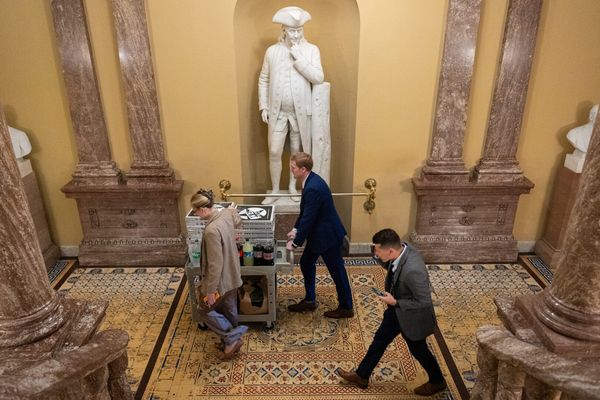It took Lex Greensill two decades to ascend from the red dirt of his family’s sugar cane and melon farm in Australia to heading his own finance firm and traveling the world on a fleet of private jets. His fall back to Earth took just a week.
On March 8, his company, Greensill Capital, which boasted billions of dollars in backing from investors such as SoftBank Group Corp. and General Atlantic, collapsed into insolvency. In October, Greensill predicted he would soon sell a small stake of the company for hundreds of millions of dollars, implying a valuation of roughly $7 billion. Finance house Athene Holding Ltd., picking through what’s left of the company, found little of interest beyond computer systems and some intellectual property, which it offered to buy for only $60 million—though that deal now appears questionable. “There were red flags everywhere,” says Stephen Clapham, a forensic accountant who’s examined some of Greensill’s packaged loans. “If I were a professional investor, it would literally take me five minutes to decide that this was uninvestable.”
The collapse was triggered a week earlier, when Credit Suisse Group AG froze redemptions from a $10 billion suite of funds that had invested in Greensill’s products. After an insurance policy protecting against defaults on debt issued by Greensill lapsed, the assets could no longer be valued with any certainty. A last-ditch legal effort to compel the insurer to continue coverage of the notes failed, setting off a chain reaction, with German regulators seizing control of a Greensill-owned bank, another fund freezing redemptions, and the firm’s founder desperately seeking a white knight to bail him out.
Greensill's fall has reverberated around the world, threatening reputations, fortunes, and tens of thousands of jobs. Japanese insurer Tokio Marine Holdings Inc. is probing the validity of insurance policies on some Greensill loans. German towns with deposits at Bremen-based Greensill Bank AG risk losing their cash. Steel mills and aluminum smelters in France, Spain, and the U.K. face potential shutdowns as credit from Greensill dries up. Britain's National Health Service had to pay pharmacists for drugs financed by Greensill. Switzerland's venerable Credit Suisse is being scrutinized over the funds it ran in partnership with Greensill, with several senior staff suspended as a result.
Greensill Capital said it specialized in financing invoices, a humdrum form of lending typically dominated by financial giants with the scale needed for such a low-margin business. Greensill insisted he could compete by “making finance fairer” via faster payments to producers such as his family’s farm and even far smaller operations. But questions about the extent of Greensill’s lending to one customer in particular, steel magnate Sanjeev Gupta, drew scrutiny from Germany’s financial regulator. Greensill could legitimately claim blue-chip clients such as Airbus, General Mills, and Vodafone, but documents submitted to a London court show that 90% of the company’s revenue was from only five customers, the biggest of which was Gupta’s GFG Alliance.
Lex Greensill had a reputation for indulgence, with a fleet of four private planes and a sumptuous suite of offices across the street from London’s Savoy Hotel. And he successfully tapped into the global power elite to facilitate his rise: He won strong endorsements from A-list tech investors and counted former U.K. Prime Minister David Cameron and former Australian Minister for Finance Julie Bishop as advisers. The extravagance caught the attention of Lord Paul Myners, a member of Britain’s House of Lords, who submitted a slew of questions in parliamentary proceedings about the company’s dealings. In late 2019, Greensill invited him to a chat to explain the operation, but Myners walked away from the meeting with little understanding of what the company was up to. When pressed for details of how his relatively small firm was able to successfully face off against the titans of global finance in a hypercompetitive business, Greensill responded with “talk about how he was traveling so much that he’d had to add another private jet,” Myners says.
As well as the more prosaic invoice financing Greensill specialized in, court filings show his company had begun a practice called “future accounts receivable finance.” The term refers to loans against sales that haven’t yet occurred—for instance, examining a year’s worth of credit card receipts at a pharmacy and then offering cash in exchange for a claim on the income the store expected to receive in the coming months. Smaller or less financially stable borrowers such as independent pharmacies—or Gupta—would typically pay a bank several times as much interest for an unsecured, short-term loan as Greensill was charging them. The extent to which Greensill did this is unclear, but court documents show that GFG had become increasingly reliant on that form of financing in recent weeks. Greensill declined to comment.
In the end, it may have been the close ties to Gupta that tripped up Greensill. An audit of Greensill’s bank by Germany’s financial regulator, BaFin, turned up no evidence of some receivables the financial house said it had purchased from Gupta’s GFG, suggesting some loans weren’t secured with past sales. The bank says it’s always been transparent with regulators, and Greensill himself has argued that basing interest rates on past financial results should be replaced by his method of examining near-real-time data such as recent invoices. The credit business today “is kind of like trying to drive your car at 100 miles an hour by looking only in the rearview mirror,” he said in a December Zoom call, “which seems like a fairly crazy thing to do.” For regulators, it turns out, that’s not half as crazy as the business Greensill built. —With Harry Wilson and Luca Casiraghi
©2021 Bloomberg L.P.







